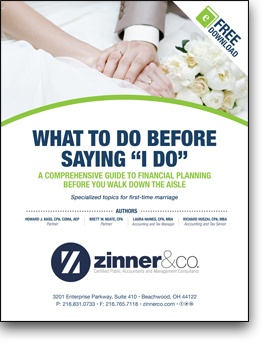Tax season. For those due a refund, the focus is how to get their refund sooner. While many remain calm realizing it’s time to sift through their shoe box full of 2016 papers and gather needed receipts to get the process in motion, others experience a high level of stress stemming from confusion or uncertainty as to what they will need to help their accountant accurately prepare their income tax return.
What can you do to be one of the calm and peaceful taxpayers enjoying a speedy refund? Simple. Learn the seven things that your accountant needs to receive from you to prepare your taxes efficiently and, ultimately, help get your tax refund sooner.
For Individual Taxpayers
- Mortgage interest and property taxes
Your mortgage lender likely issued you an IRS Form 1098 at the beginning of the year that summarizes your mortgage interest and property tax payments you made throughout the previous year. Your accountant should ask you for this form to claim the mortgage-interest deduction that is available to homeowners (there are limitations). Your accountant will also refer to this to calculate part of your home-office deduction, if applicable. If you carry more than one mortgage, be sure to provide Form 1098 for each as you can also potentially deduct interest paid on one other property as a second qualified residence. This is also the case if you have both mortgage interest and home equity loan interest on your residence.
- Don’t forget your 1098-T!
The IRS rewards those who go to school by offering very generous education credits. You can save up to $2,500 by using the American Opportunity Credit and up to $2,000 by using the Lifetime Learning Credit. The education credit is applicable if the college or vocational school is:
- Accredited and
- Eligible to participate in a student aid program administered by the U.S. Department of Education.
The IRS realizes that this generosity has caused criminals to abuse the system by filing fraudulent tax returns claiming these credits to trigger larger refunds. Consequently, with the passage of the Preferences Extension Act of 2015, the IRS added a new requirement that must be met in order to claim an education credit. Starting with the 2016 tax year, you must have a 1098-T tuition statement in order to claim either of these credits.
For Business Owners:
- Company Financial Statements
Your company financial statements are the building blocks of your business. Financial statements include three main reports: a balance sheet, an income statement, and a cash flow statement. If possible, bring a clean trial balance and general ledger (your accountant will thank you profusely!). For tax purposes, the income statement and the trial balance are the documents most relied upon by your accountant as they contain all the activity for the year along with the ending assets and liabilities.
- Automobile Mileage and Expense Log (for those who are self-employed)
If you use your own vehicle for business purposes, you can claim a portion of the car’s upkeep expenses as a tax deduction against your business income. The IRS allows you to calculate this one of two ways: either the actual expenses method or the simplified method.
- The simplified method allows you to apply an IRS-mandated mileage rate to the total business miles driven in the year. For the tax year 2016, the standard mileage rate is $0.54 per mile.
- The actual expense method is one’s other choice for deducting the business-related cost of the use of a vehicle. Know first, you cannot use both the actual and simplified expense method. The actual expense method requires you to keep a detailed log of vehicle expenses, such as gasoline, oil, license fees, lease payments, tires, and deprecation. If you use your car personally at all, you will have to be careful in tracking your mileage, making certain that you separate your business use from your personal use. Yes, this means you (or your accountant) will need to allocate what percentage of total vehicle expenses were used for business purposes. While the actual method requires much more detail and recordkeeping, it also provides (typically) a greater deduction for the automobile expense. The IRS suggests if you are unsure which method is most advantageous, to calculate or project under both methods and take the larger deduction of the two.
Understand, if the vehicle you are using is provided by your employer, you can only deduct unreimbursed expenses.











